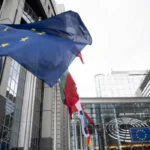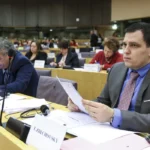Five European Union countries close to Ukraine have together decided to call for an extension of restrictions on Ukrainian grain imports, implemented to protect their farmers until the end of the year, announced the Polish Minister of Agriculture, Robert Telus.
After a meeting by videoconference with his counterparts from Romania, Slovakia, Hungary and Bulgaria, the minister indicated that the five countries had reached a common position on the issue. “We support an extension of the ban on [Ukrainian grain] imports into our countries until the end of the year,” Robert Telus told reporters on August 25, 2023.
Poland on the front line
The European Commission had authorized at the beginning of June these five States to extend until September 15 their restrictive measures aimed at blocking on their territory the marketing of Ukrainian wheat, corn, rapeseed and sunflower, which, according to the farmers of these countries, causes prices to collapse in local markets.
Poland has warned that if the European Union does not give the green light for an extension of restrictions, it will impose them unilaterally. “Poland will definitely do it, Hungary will definitely do it,” said Robert Telus. In July, these five countries had already called on the European Union to allow them to extend the restrictions beyond September 15.
Diplomatic dispute
The issue of Ukrainian grain imports has caused a diplomatic dispute between Poland and Ukraine, two allied countries. In July, a Polish presidential adviser, Marcin Przydacz, said Warsaw was prioritizing “defending the interests of European Union farmers by asking for the extension of restrictions on Ukrainian grain imports.”
The Polish adviser had called on Ukraine to show appreciation for “the role that Poland has played” in supporting it against Russian aggression. kyiv reacted by summoning the Polish ambassador to its foreign ministry.
The European Union has become an important transit route for Ukrainian grain exports.
This article is originally published on lafranceagricole.fr







